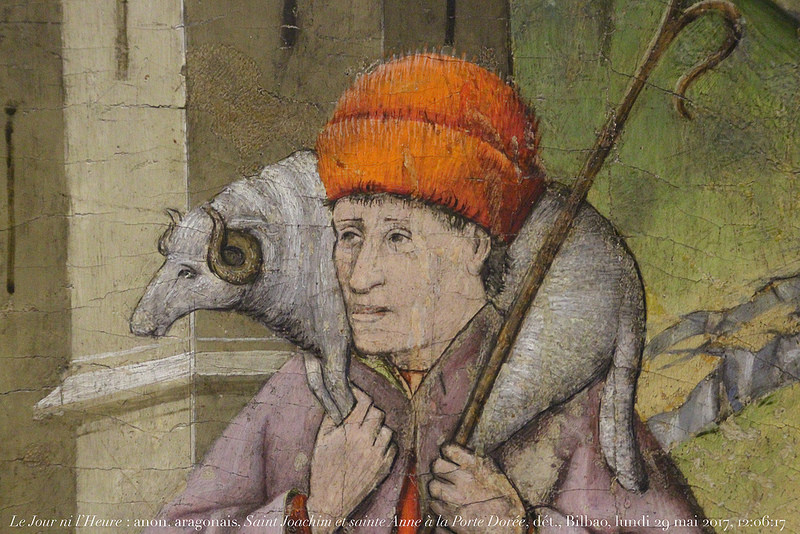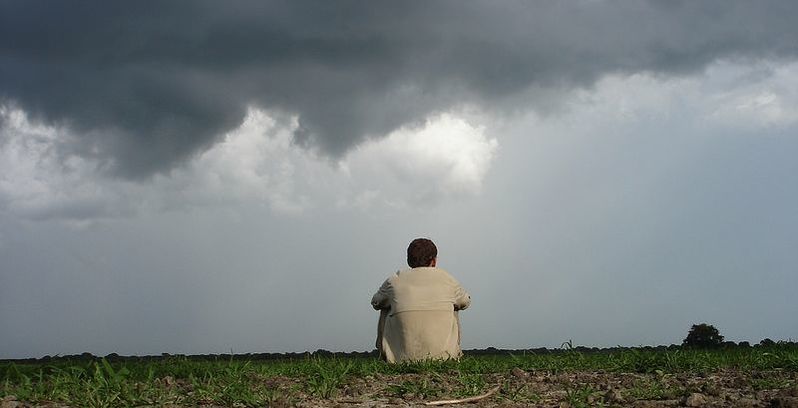 Tishrei, the seventh month on the Hebrew calendar, is filled with blessings. It is significant that seven is the number of completion, fullness and perfection. Genesis 2:3 tells us, "And God blessed the seventh day and made it holy, because on it He rested from all the work of creating that He had done." This He did after He "saw all that He had made, and it was very good." (Genesis 1:31) Seven is an important number in the Kingdom of God!
When God completes something it is always good! The fall feasts, in the seventh month, are a celebration of what has been completed and an opportunity to look forward to what is in the future. Our God, who is the same yesterday, today and forever (Hebrews 13:8), always has more for us. Tishrei is a month to pause and remember God's goodness and experience His glory. This is not a time to be passive but to press in to receive all that God has for us. As Paul says in Philippines 3:12, "...I press on to take hold of that for which Christ Jesus took hold of me." He makes Himself available to us in this season by calling us to tabernacle (sit at the table) with Him. For those of us who are hungry for more of God, this is a time to push forward for more intimacy with Him. The goal is to touch Him so that He releases into us more of Himself. We would do well to emulate the woman who had the issue of bleeding that is written about in Matthew 9, Mark 5 and Luke 8. For 12 years she suffered greatly! Mark writes what she must have been thinking: "If I just touch His clothes, I will be healed." (Verse 28) Matthew puts in this way: "If I only touch His cloak, I will be healed." (Verse 21) This was a desperate woman! She had been on a pursuit to be healed for 12 years but saw no improvement. She found herself in the midst of a crowd of people following Jesus to the home of a synagogue ruler named Jairus whose 12 year old daughter was dying. Luke reports, "As Jesus was on His way, the crowd almost crushed Him." (Verse 42) Imagine the desperation she must have felt to push through this huge, unruly crowd! Remember also that she would have had to ignore societal rules that forbid women from interacting with religious leaders. Something inside of this woman told her that this was her kairos moment. (Kairos is a Greek word meaning qualitatively new. e.g. "See, I am doing a new thing!" - Isaiah 43:19) She had to seize the moment because God was going to do a new thing in her life. He had made Himself available and His Kingdom was at hand. As she pressed in to touch Jesus, "she felt in her body that she was freed from her suffering." (Mark 5:29) The power that was in Jesus was released to this woman who had the Chutzpah to press in to touch Him. The action taken by her was not easy. When Jesus asked who touched Him, she "came trembling and fell at His feet." (Luke 8:47) Jesus affirmed her faith and sent her forward in peace into the new thing that was being done in her life. Receive this story as an encouragement to press in for more of the Lord for yourself. We are in the seventh month where Jesus invites us to tabernacle with Him. This is a kairos moment! May our pursuit of Jesus be as desperate as this woman's. It is our unbridled worship that touches Jesus. In return, He releases His healing and restores and renews us. "Blow the trumpet in Zion; sound the alarm on my holy hill. Let all who live in the land tremble, for the day of the Lord is coming. It is close at hand--" (Joel 2:1) The blowing of the trumpet or shofar is an integral part of the celebration of Yom Teruah or Rosh Hashanah (The Jewish New Year). The sound of the shofar is designed to summon Israel, the Church and the world to repentance. It initiates what is called The Ten Days of Awe--those days leading up to Yom Kippur (The Day of Atonement).
Rosh Hashanah is celebrated according to Leviticus 23:24. "...On the first day of the seventh month you are to have a day of rest, a sacred assembly commemorated with trumpet blasts." This day should be a reminder for all Believers that one day God Himself will blow the shofar as a signal that indicates the end of the age is upon us. Zechariah 9:14 declares, "The Sovereign Lord will sound the trumpet..." As I mediated on Joel 2 a question arose in my mind. Could it be that the Lord is using what is happening in nature as the beginning of sounding the alarm to let us know that the time of His coming is drawing near? All creation is groaning with sound--the crackle of the fire, the rush of the wind and the crash of the waves! Chapter 21 of Luke talks about some of the signs of the age. "Jesus said, 'When you hear of wars and revolutions, do not be frightened. These things must happen first, but the end will not come right away.' Then He said to them: 'Nation will rise against nation, and kingdom against kingdom. There will be great earthquakes, famines and pestilences in various places, and fearful events and great signs from heaven.'" (Luke 21:9-11) Jesus also warned his disciples that they would be brought before kings and governors on account of His name which would allow them to be witnesses to these people. He promised to give His disciples words and wisdom in these situations. (Luke 21:15) Luke continues to record the words of Jesus in verses 25 and following: "There will be signs in the sun, moon and stars. On the earth, nations will be in anguish and perplexity at the roaring and tossing of the sea. Men will faint from terror, apprehensive of what is coming on the world, for the heavenly bodies will be shaken." Could it be that God is summoning us to repentance and renewal? How should we respond? Let us participate in the Ten Days of Awe. Tishrei 1 (the first of the seventh month on the Jewish calendar)--the beginning of the New Year--occurs on Thursday. Let us use this time as one of introspection and repentance. Let us turn toward the Lord in prayer and confess our sins and the sins of our nation and plead for His mercy as Daniel did for Israel in Daniel 9. This is a time of spiritual preparation for God's New Year. It is a time of getting right with Him and of preparation for the final fall feast--The Feast of Tabernacles or Sukkot. This time, to sit at the table together in thanksgiving to the Lord, may be the time when we encounter His glory. Look at the approaching feasts as a time of opportunity--one to get right before God and to meet Him face to face. The song "Reckless Love" by Steffany Gretzinger recounts some of the ways the Lord displays His love for us. He sings over us, breathes life into us, fights for us, and paid it all for us. The love of God is relentless! The song declares, "There's no shadow You won't light up, mountain You won't climb up, coming after me. There's no wall You won't kick down, no lie You won't tear down coming after me." Indeed, God's love is reckless! This word conveys the thought of a person who is so consumed with love that all concerns for their own welfare are set aside. The dictionary defines reckless as careless, heedless, foolish, wild and rash.
When trying to describe God's love the chorus of the song says, "Oh the overwhelming, never ending, reckless love of God. Oh, it chases me down, fights 'till I'm found, leaves the ninety-nine. I couldn't earn it, I don't deserve it. Still, You give yourself away. Oh, the overwhelming, never ending, reckless love of God." Let's think about this word reckless. The Lord loves us so much that He would leave 99 others just for you or me. Both Matthew and Luke tell how Jesus taught this truth using sheep as an analogy. After having explained to His disciples that they need to be humble like little children in order to be great in the kingdom of heaven, Jesus launches into a teaching on the love of God. "See that you do not look down on one of these little ones. For I tell you that their angels in heaven always see the face of my Father in heaven. What do you think? If a man owns a hundred sheep, and one of them wanders away, will he not leave the ninety-nine on the hills and go to look for the one that wandered off? And if he finds it, I tell you the truth, he is happier about that one sheep than about the ninety-nine that did not wander off. In the same way your Father in heaven is not willing that any of these little ones should be lost." (Matthew 18:12-14) Luke 15:5-7 repeats the words of Jesus on this subject with more insight regarding finding the lost sheep. "And when he finds it, he joyfully puts it on his shoulder and goes home. Then he calls his friends and neighbors together and says, 'Rejoice with me; I have found my lost sheep.' I tell you that in the same way there will be more rejoicing in heaven over one sinner who repents than over ninety-nine righteous persons who do not need to repent." Those hearing the story of the shepherd who left 99 sheep to find one would understand that the head shepherd would leave the rest of his flock with his helpers so that they are not unattended. However, it is significant that the head shepherd is the one who leaves to seek the lost sheep. His priority is saving that one! So too our Shepherd King, Jesus. He left the throngs of heaven that worship Him day and night to come to earth to seek the lost. "For the Son of Man came to seek and to save who was lost." (Luke 19:10) Every single person on the face of the earth is important to our God. As it says in 2 Peter 3:9, He is patient with us, "not wanting anyone to perish, but everyone to come to repentance." He went to extraordinary measures to run after us. Our King Jesus gave up everything and subjected himself to death on a cross so that we could have everlasting life and be in heaven with Him for eternity. Oh the love of God! It is incomprehensible! His love is overwhelming, never ending and reckless! Occasional mishaps were a part of our yearly trip to New Hampshire as we trailered our boat. One particular trip, when my children were young, stands out in my memory. I was driving the car along a section of the Massachusetts Interstate that had a deep ravine filled with boulders and pine trees along its side. A large tractor trailer sped by, pushing air as it did so. The air mass picked up and moved the trailer with such force that the steering wheel popped out of my hands. Down the ravine we went with me raising my hands and crying out to God. Miraculously, the car and trailer were turned around and landed on the grass strip parallel to the road with only a dent in the bumper of the car and a flat tire on the trailer. To this day I cannot explain why we did not all die in this accident other than the hand of God reaching down to save us. I believe that he responded to my cry.
It should be natural for those who know the Lord to cry out to Him when we are in distress and in need of help. Yet, we are frequently timid in our prayers and may not follow the Biblical example of crying out to the Lord. The prophet Jeremiah was encouraged to do just that. "Call to me and I will answer you and tell you great and unsearchable things you do not know." (Jeremiah 33:3) We can read over 100 verses in the Bible where God's people cry out to Him for different reasons and He responds. The Israelites were instructed to give thanks to God with a firstfruits offering and a declaration to Him of what He had done for them. "But the Egyptians mistreated us and made us suffer, putting us to hard labor. Then we cried out to the Lord, the God of our fathers, and the Lord heard our voice and saw our misery, toil and oppression. So the Lord brought us out of Egypt with a mighty hand and an outstretched arm…” (Deuteronomy 26:5-8) Because of their sin, the Israelites frequently found themselves under the oppression of their enemies. When they could no longer tolerate the cruel regimes to which they were subject, "...they cried out to the Lord, and He raised up for them a deliverer..." (Judges 3:9) Jabez was distressed over the name his mother gave him. It means "I gave birth to him in pain." 1 Chronicles 4:10 tells us, "Jabez cried out to the God of Israel, 'Oh that you would bless me and enlarge my territory! Let your hand be with me, and keep me from harm so that I will be free from pain. And God granted his request." 1 Chronicles 5:20 makes a direct correlation between crying out to God and His response in one of the battles the Israelites had with their enemies. "They were helped in fighting them, and God delivered the Hagrites and all their allies into their hands because they cried out to Him during the battle. He answered their prayers, because they trusted Him." I see here that trust in God is demonstrated as we verbalize our need. The Psalmist recounts the faithfulness of God in response to the cries of His people. "They cried out to you and were saved; in you they trusted and were not disappointed." (Psalm 22:5) When we cry out to God He hears us and responds with answers we may not see directly. An example of this is seen from the results of Stephen's cries to the Lord. "While they were stoning him, Stephen prayed, 'Lord Jesus, receive my spirit.' Then he fell on his knees and cried out, 'Lord, do not hold this sin against them’...And Saul was their giving approval to his death." (Acts 7:59-60) A while later, Saul met the Lord on the road to Damascus and became a fervent follower of Christ, writing most of the New Testament. The Lord hears our cries. He is drawn to the sound of our voices when we cry to Him with all our hearts. It is confirmed in Scripture: "The Lord is near to all who call on Him; to all who call on Him in truth. He fulfills the desires of those who fear Him; He hears their cry and saves them." (Psalm 145:18-19) Use your voices, dear ones. Let the Lord hear the cry of your hearts. He will respond according to His perfect will for us. |
Joan E. MathiasCategories
All
Archives
July 2024
|



 RSS Feed
RSS Feed